Bessie Duke-Odu: The Flair Hair Academy was born out of my refusal to rest on my oars
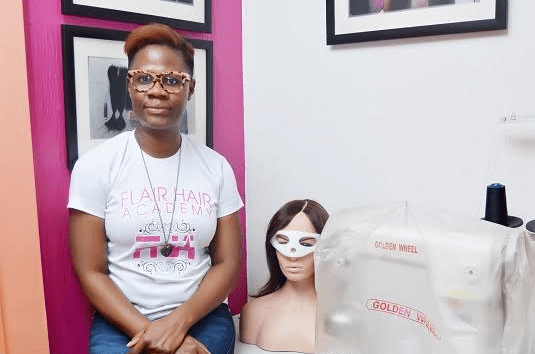
[bctt tweet=”Africa has come of age and needs to get industrialized hence sharing my expertise through the Academy” via=”no”] Bessie Duke-Odu is the Proprietress and Lead Posticheur at Flair Hair Academy (Nigeria’s foremost Human Hair Academy). With a degree in Microbiology, she started off merchandising human hair and hair accessories and in 2010. The Bessie consciously decided to delve further into the research, manufacturing procedures and processes of human hair. She is Korean-trained by the renowned John Korea Hair School in South Korea. Bessie has also acquired degrees from various institutions in Germany, the United States, China and the United Kingdom. Bessie Duke-Odu is also a World Bank Scholar, an alumna of the prestigious Enterprise Development Centre (PAN-ATLANTIC UNIVERSITY), a professional member of the Complementary Therapist Association (UK) and is listed in the Embody Magazine UK as a qualified service provider. Can you tell us what most people don’t know about you? Hmm…that’s a broad one. Over the top of my head, I’d say my tenacity. I rarely give up on things or people. I’d rather buy furniture from IKEA where I can lay the manual out flat, assemble the bolts and every other fitting accessory and work my way to the finished look. You have a degree in Microbiology, why did you go into merchandising human hair and hair accessories? Now, that sounds like two extremes but I guess I naturally flowed to my inherent side. As early as when I was 8-9 years old, I could weave hair and I picked that up by just watching. At the time when I started merchandising, running the hair and accessories enterprise gave me the ample time to tend my new baby and adjust to motherhood without the pressures of a paid 9-5 whilst still being economically viable. What lead you to start Flair Hair Academy? Flair Hair Academy was born out of my refusal to rest on my oars, challenging status quo as it were. Essentially with the knowledge acquired over time, floating a range of wholly made in Nigeria hairline would’ve been exclusive to me. But Africa has come of age and needs to get industrialized hence sharing my expertise through the Academy. What’s one thing about your industry that you didn’t expect before getting into it? As the progenitor in this, it has its first mover advantages as well as disadvantages. Acquiring knowledge has been hugely capital intensive. Nonetheless, every accomplishment begins with the decision to try as successful self-actualization lies just outside your comfort zone. [bctt tweet=”Every accomplishment begins with the decision to try – Bessie Duke-Odu” username=”SheLeadsAfrica”] You’ve been trained in South Korea, China, Germany, and the United States, can you tell us a bit about that and why you decided to choose these countries? Absolutely, I realize that knowledge is power but it takes my enthusiasm to keep pulling that switch. From my research, I discovered that Korea played a huge role during the early years of world industrialization especially after wig making moved to the East. All the named countries have what is unique to them and I am glad to give enrollees a good mix. As an ardent learner, I never restrict my self-development to capital or anything else. I would rather trade in my phone or other paraphernalia to learn a new skill than to walk around with all of that unskilled. I also recognize that going to YouTube to feed off all sorts is an option but I made a conscious and informed decision to research and invest; knowing that a small amount of knowledge can mislead people into thinking that they are more expert than they really are. [bctt tweet=”I’d trade in my phone to learn a new skill than to walk around with all of that unskilled” via=”no”] What kinds of services do you offer? Our bailiwick is in training, handing down well-researched hair manufacturing skills to people who value their development. We train people on how to set up mini hair factories, improve existing salon services, upscale human hair businesses from just buying and selling to production capacity thus reducing to the barest minimum importation on finished hair goods into the country/continent. We also offer contract manufacturing to hair vendors. Our courses include Machine Wefting, Wig Making, Human Hair Texturing, Hackling, Wig posting, Preparation of raw hair, Handtied Wefting, Human Hair Processing and Human Hair dyeing. We have an upcoming Wig Making Workshop this July and enrollees will learn the history of Postiche, how to ventilate a closure, frontal, full wigs, create templates, lace repairs and so on, all from scratch. We help them develop their value proposition and build a sustainable business model canvas. At Flair Hair Acamedy, we have had enrollees from Cameroon, Kenya and within Nigeria. Practically anyone (novice or hair guru) can go through our training and learn the ropes effectively. What do you think makes Flair Hair Academy different from others? Simply put, our resolve for greatness and constantly outdoing ourselves. What movie did you watch recently that stood out to you? Aww…. Definitely “Me Before You”. I teared up and got very emotional. It is a must watch. Look for it! Sponsored post
Lorraine Maphala Phiri: A brand for every woman who understands the importance of quality over quantity
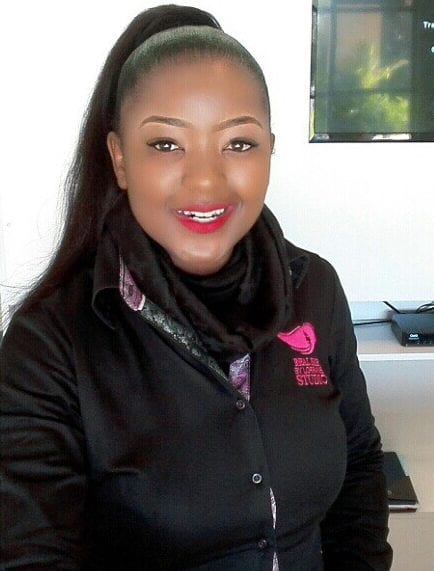
[bctt tweet=”We do more than just sell hair we educate our clients on the different types of hair” username=”SheLeadsAfrica”] Born 33 years ago, Lorraine Maphala Phiri has been nominated Female Entrepreneur of the Year 2016 at the Megafest Business Awards Southern Region. The former model is certainly making a mark in the business sector. Lorraine proves that she is a beauty with brains as she has established herself and booming business well. Lorraine has exhibited exceptional modelling prowess both locally and internationally, distinguishing herself with a unique versatility that has seen her excel during the early stages of her career. SLA contributor Neo Cheda got to chat with her, however, about her career and her business venture: Real Hair By Lorraine. Tell us about your modeling career, winning Miss Zimbabwe and going on to represent the country in Miss World. Representing my country at Miss World had always been my dream. Since high school, I always had a desire to speak and be heard. Coming from a dusty suburb of Nketa 6 it was a dream I never imagined would come true. Winning Miss Zimbabwe 2005 was a life changing moment for me as it opened doors I never thought I could go through. It was fulfilling and rewarding and proved to be a great platform for me to establish my career and brand. Tell us about your business, what product or service you provide and who your target audience is. Since the end of my reign, I have been busy growing Lorraine as a brand. Real Hair by Lorraine (RHL) is a proudly Zimbabwean brand specializing in 100% human hair i.e. Indian hair, Mongolian hair lace wigs, and all things hair. Real Hair by Lorraine Studio was then birthed after the hair brand when I realized the gap in Bulawayo, Zimbabwe for a professional upmarket hair salon. We offer beauty services as well, nails and mail art. Our target market is every woman who desires to look beautiful, feel beautiful and be treated like the Queen they are. It’s a brand for every woman who understands the importance of quality over quantity. We don’t just sell hair it’s a lifestyle. Women have also shown us great support and at the moment we have one branch in Bulawayo and an online shop which helps us supply hair products to customers in Europe, Harare and South Africa. We are different from most people in the hair business because we do more than just sell the hair but we educate our clients on the different types of hair and how to take care of it.” Please tell us what being a business owner means to you and why you became an entrepreneur in the first place? Being a business owner for me means a lot of sacrifices, being able to change people’s lives through your work and empowering families by providing jobs. The fear of poverty and being ordinary inspired me to be an entrepreneur. I became an entrepreneur because I love starting something totally new and seeing it come to life. I love challenging myself and I have always been a dreamer a big dreamer. From a young age I always knew that I would end up a businesswoman, I just didn’t know what kind of business I would venture into. [bctt tweet=”The fear of poverty and being ordinary inspired me to be an entrepreneur – Lorraine Maphala Phiri” username=”SheLeadsAfrica”] How do you achieve work-life balance? It’s an art and I’m still learning. However, having a strong support system at home makes it a lot easier and with my ability to prioritize, everything just falls into place. What or who has been your greatest influence in business and why? How did you get where you are today, and who/what helped you along the way? My husband’s work ethic has been my greatest influence in my business, however, I have always aspired to be a business woman to be reckoned with. I would never be where I am today without the sacrifice of my parents who continued to pick me up even when my businesses hit rock bottom. Their encouragement and faith in my dreams Their encouragement and faith in my dreams are what has kept me going. I am still work in progress I have not arrived yet lol. Maybe next time we speak I will be Dr. Lorraine. What would you say is your greatest professional accomplishment to date? Being founder and MD of Real Hair By Lorraine Studio. What’s the best advice you have received in business that you wish to pass on to our readers? Start where you are with what you have, the best time to start is now. If you’d like to share your story with She Leads Africa, let us know more about you and your story here.
Twitter Chat with Thokozile Mangwiro: Starting a natural hair business in Africa (Oct. 27th)
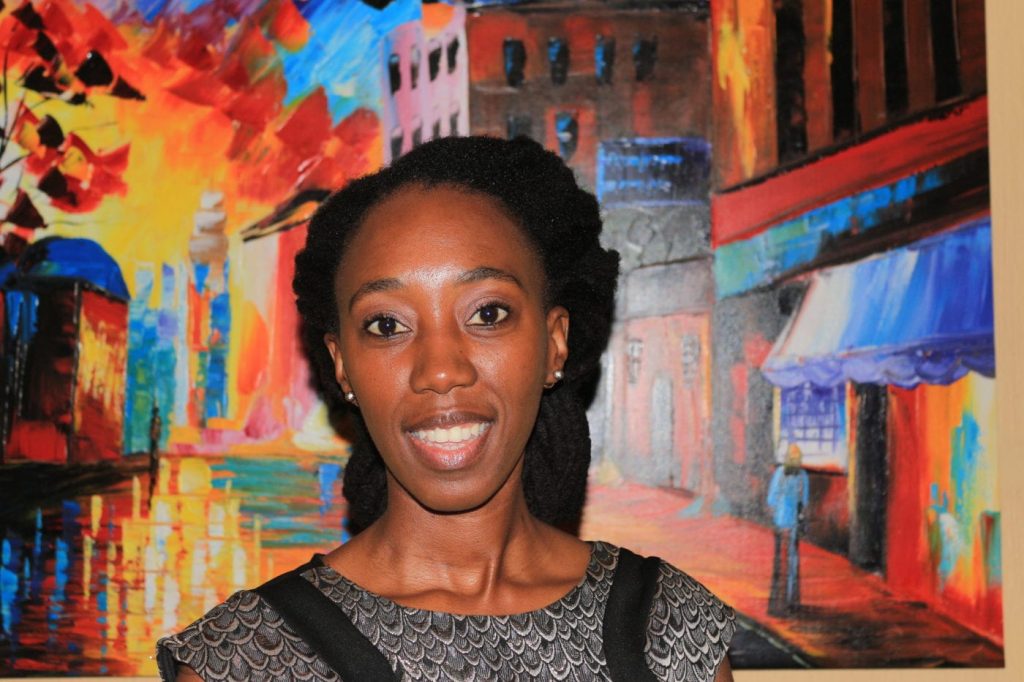
All you natural hair ladies out there know that the struggle can be too real. Between trying to find products that work for your hair, to looking for products with organic ingredients. These struggles can be further exasperated when you live on the continent and you want to buy local or you have aunties telling you to go fix your hair. Now put this all in the context of trying to start a natural hair brand and you’ve got quite a complicated recipe on your hands. It’s in these complicated situations where champions are born and Thokozile Mangwiro is one such champion. After being unable to find locally made natural hair products in her native South Africa, she decided to start her own line. Join us Thursday Oct. 27th for a Twitter Chat with Thokozile as she shares how she built her natural hair business, Nilotiqa, in South Africa and her advice for other naturals and budding entrepreneurs. Whether you’re an African natural, a natural hair product junkie or an aspiring entrepreneur in the beauty industry, you don’t want to miss this chat. Follow She Leads Africa on twitter and use the hashtag #SheHiveJoburg to ask your questions and participate in the discussion. Topics that we’ll cover: What it’s like being natural in South Africa The importance of buying localy products How to start a natural hair line, from resources to customers and more Advice for natural hair ladies and apiring entreprenuers Twitter chat details Date: Thursday Oct. 27, 2016 Time: 1pm NYC // 6pm Lagos // 7pm Joburg Location: Follow She Leads Africa on twitter and use the hashtag #SheHiveJoburg About Thokozile Mangwiro It is in growing her own natural hair for the past 15 years that Thokozile Mangwiro found her inspiration to create a natural hair care product line. After going to several salons and an endless search of locally produced products that truly work for afro natural hair, it was clear that there was a HUGE gap in the market for professionally formulated products for natural hair. Thokozile, like many other women, struggled with extremely dry hair. This and the lack of knowledge led to intense research and experimentation of natural ingredients such as Shea butter and avocado oil for skin and hair. After several years of research, formulations and product testing, Thokozile launched Nilotiqa, a line of products that are proudly made with organics, natural and naturally formed ingredients to deeply moisturize and nourish ethnic Hair. Thokozile Mangwiro is an Information Technology Masters graduate from the University of South Africa, with over 8 years’ experience in the database administration, analysis and intelligence industry. She is a wife and mother of two energetic boys, Anesu and Omari. She is born and bred in South Africa, Johannesburg. A budding entrepreneur, she is driven and passionate by empowering and inspiring other women to feel naturally beautiful through products that are made in South Africa, are of the highest quality, are beautiful and luxurious, to showcase to the world.
Pretoria Girls High School: 5 lessons I learned from African girls fighting for their Afros
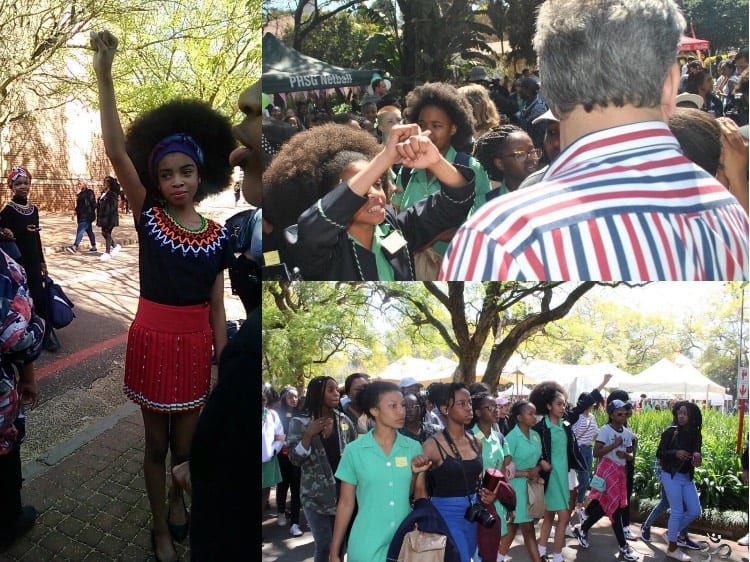
If you have not been living under a rock, you must have heard about the news that ruled the headlines last month. A group of girls in South Africa —who we would all like to adopt into our #SquadGoals— protested against their school for the subliminal and direct ways that they were being racist towards them. The subject in question was their natural hair. As an African living in the US, this trending topic about how unprofessional and untamed natural hair is, is not new to me. Growing up in Ghana, I had heard all the “hair is distracting” arguments. This is why most African girls rocked bald cuts for most of our childhood. What was news to me however, was someone telling African children that their natural hair was unnatural. There is a difference between distracting and unnatural. It’s like going to a school in London and telling the school children that their natural British accents were unnatural. From rocking a bald cut, to having permed strands to now growing kinky curls, I have experienced all the angles on the subject of ‘African Hair’. These are the 5 thoughts I had as I marvelled at the girls from Pretoria Girls High School. Stop telling us what to do with OUR hair Whether permed or kinky, whether braided or dreaded…African women know what they want to do to their hair. And we don’t need your two cents. If African women have to defend their hair everywhere else, should Africa be one of those places? When I heard this story in the news, the first question I had was “Where can we stand?” African features have been under attack since long before we can all remember. From our broader nose to our bigger lips. And now our hair. The fact that African features was being attacked in Africa of all places was unbelievable to me. I felt insulted, that this fight had found its way into our backyard. Are Africans not supposed to find a safe haven in their home? Representation matters I immediately thought of Sarafina when I saw Zulaikha Patel fighting with her fist up for what she believed in. African Americans and other minorities in America, fight every day to be represented respectfully in film, culture and the arts….so should African children not be represented in Africa where they belong home? We should not be denied the freedom of seeing people who look just like us and with hair just like ours. It warms my heart to know that almost thirty years after the movie Sarafina came out, these girls in Pretoria where able to draw the same kind of strength to stand up for what they believed in. Don’t tell us how to fight the issues that only affect us Don’t you love it when the people who are least affected by an issue tell the people most affected by the issue how to cope. (Looking at you, #AllLivesMatter). The problem with telling young girls to ignore the racial issues going on in their schools is that we neglect the fact that they will have to still deal with these same issue when their future employers are telling them their Afro is unprofessional. Problem #2 with the statement in the image above: How do you expect black girls to excel academically if they have to deal with the mental chains of society telling them that their blackness is unnatural? We are strong but we are tired of defending ourselves We are tired of defending our darker skin. Tired of explaining why saying “You are pretty for a dark skin girl” is not a compliment. Tired of hearing the snide comments about how our hair would be more manageable if it was straighter. Tired of hearing how the traits that are most natural to us are somehow unnatural. Teach girls to fight The future of Africa lies in the people who dare to fight for it….and the girls in Pretoria Girls High School fighting for their Afros are all kinds of #goals. These girls came together to raise their voices and change the dialogue in the culture. These girls stood up and peacefully protested. They got made the world listen. They captured the attention of world leaders, all because they decided to be girls who fight. Girls need to be taught that they too have the power to fight for a good cause. Fighting to change the world is not just an exclusive club for Nelson Mandela and other men. African girls can change the world if they will only fight.
Sharon Adeleke: I may be Davido’s sister but I make my own money
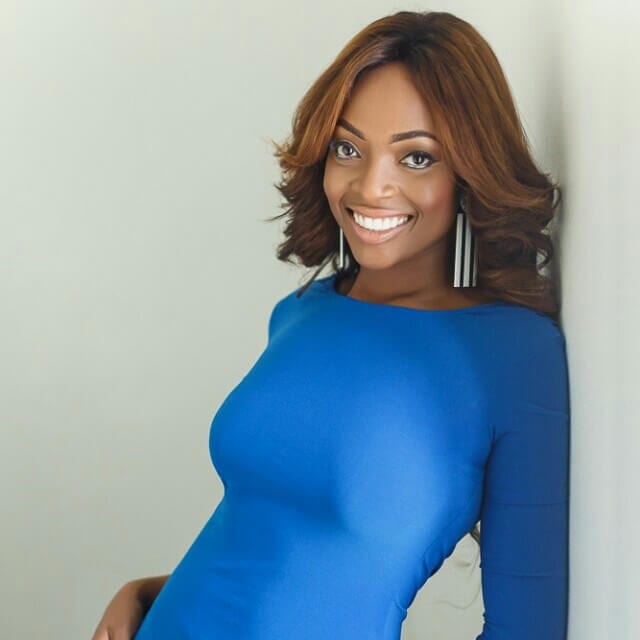
While some may know her first as superstar Davido’s sister, Sharon Ademefun (nee Adeleke) is a #MotherlandMogul in her own right. She is the brains behind Rona Wigs Studio, a business that makes hairpieces and extensions. Sharon taught herself how to make wigs by watching YouTube videos. She is extremely focused on her business, busting the myth that coming from a wealthy home means a woman doesn’t have to work. Sharon shares her business and life experiences with SLA contributor Priscilla. She offered advice for anyone looking to start up something, as well as single ladies working their hustle. Sharon also lets us know why by the third year, your business should be able to stand on its feet. Let’s meet the Sharon that won’t pop up in a Google search I watch a lot of TV. I love watching TV when I am home. Secondly, you won’t find my kids on the net, I don’t put them on the net. I also love staying at home, I don’t go out much. If I do go out, it must be very important. I love to cook a lot even though I don’t have much time for it. What are your hobbies and how do they influence your business? My hobbies are wig-making (laughs) and sleeping. Truly, making wigs is my hobby and my passion. It was a prayer point for me that I do something I love and be able to feed myself with it. I would say that I am lucky, because I wake up each morning with excitement about my work, and it is great. Why and how did you get into wig-making? When I had my first child, I was on a lot of bed rest and I needed to make my hair. I found this lady on YouTube and I asked her to make my hair and it was really good. She used closures and they came out nice. When I had to go back to the States and needed to do another, she suggested I make a wig. But later on, I needed her to do more and she was not coming through so I just told myself, “What is in wig-making?” I got on YouTube and watched videos of wig-making and pretty much taught myself to make wigs. I made for myself at first, and my friends wanted me to make for them. That was how I got into making wigs. In the States, I started seriously going to wig-making workshops. The day I had my son, there was this big wig maker, Tokyo Stylez holding a training. Tokyo Stylez makes wigs for the Kardashians, and when I heard about his training, I literally got off my bed to attend it. I had to ask my aunt to handle things at home. What was it like at the beginning and which moments have defined your business? When I started, I was working from home. I had clients and they loved my wigs and its quality. I went for several trainings but even then, they don’t tell you everything. My friend who used to make wigs for me back then even gave me some tips. At a point, I had taken over my house and my husband basically said, “We have to move you out“. That was how I moved into the shop. Some of the defining moments of my business have been the times when I wanted to quit and then, I get a flood of orders. I have had other businesses. Right before I started Rona Wigs, I had just shut down one business. But with Rona Wigs, I find myself coming back when I almost want to leave. It’s God who has been making it all happen. From one person, my staff has grown to seven people. And by November/December this year, we will be two and a half years old. Another defining moment for me was a time when I had about 150 orders waiting for me and they had all paid 100%. What was nice was that they waited, considering the Nigerian instant gratification thing. How has your husband influenced your business and how do you balance both work and family? It has not been easy, especially at the beginning. Most times, I will be gone from about 8am till about 11pm or 12 midnight. Initially, he complained because of the times I was gone. Sometimes, I didn’t get to see my kids. I had to do a lot of placating, but he picked up the slack at home while I was gone then. He also did the entire work at the new studio for me as he is into interior development. My husband has always been supportive and that is important. Now, I have learnt to cut back and delegate work. After all the time spent at the beginning training my girls, now I know they can work without me looking over their shoulders. Although, with the upcoming new project, I know it might be like the beginning again. Now I think my husband knows that it is only for a while till things are on their feet. I don’t believe you should be a slave to your business. The first 1 or 2 years after take off will be tough. But if by the third year, you still have to always be there, then maybe your success model is not right. Your personal happiness matters because when you are happy, everything around you goes fine. It’s also important that you have someone who supports your dreams. Many women do not reach their full potentials because they are somewhat hindered by their husbands. So for single entrepreneurs, it is important you marry someone who is aligned with your dream and will help you achieve them. How has been an Adeleke influenced your business? It has its advantage and its disadvantage. For starters, people are curious and they want to see Davido’s sister working. So curiosity brings them in first. While that helps in a way, I don’t use that as a base. I treat all customers alike and while they might not buy something that first day, they usually return another day due to the warm
7 inspirational websites you need to follow
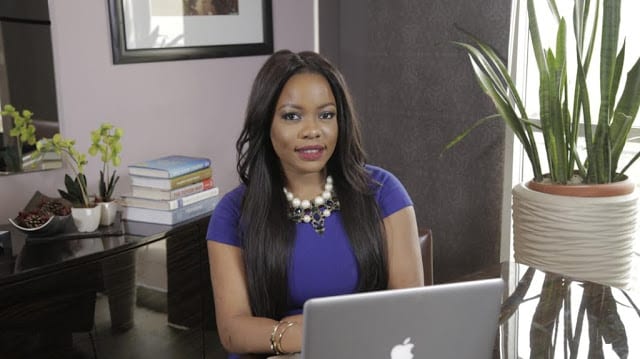
The most beautiful thing about being a young professional or career woman today is that your knowledge isn’t limited to what you can find in your neighbourhood or community. The digital world allows you to connect with experts and information from across the globe. Whatever issue you think you might have, there are probably 100 or so websites that can help you solve your problem. While there are over a too websites we love, here are 7 of our favourites that help us stay informed, motivated and ready for whatever life throws at us. 1. Smart Money Africa The Smart Money Movement is championed by financial guru Arese Ugwu. Her website provides a platform for young people to learn to manage their finances better by knowing their net worth and prioritizing the accumulation of assets over frivolous spending. In other words, being smart about your money. Keep an eye out for the blog, the Smart Money Workshops and the Smart Money Journal. They will literally change your life. You’re welcome. 2. Minding Her Business Young? Ambitious? Fabulous? Ready to move to the next level of all-round wellness? Then you need to be minding her business. Starting out as a series of motivational quotes on social media, MHB evolved into a practical guide for the modern woman in the form of an e-book covering financial success, self-confidence, love and relationships. Navigate the site to get inspired by Ivy’s story, keep afloat with the blog and to get acquainted with the book. 3. Ms Afropolitan If you’re searching for a space to address your feminist woes and reaffirm your womanhood in the African context, then this is your destination. Through its blog articles, this website dissects topical issues such as colonialism, race, politics and what it’s like living in Diaspora. It offers strong, powerful, relevant messages for women of colour. 4. Haute Fashion Africa Haute Fashion Africa is basically the fashion portfolio for the modern African woman. This website is on top of all that’s happening in the African fashion stratosphere. We’re talking all the fashion trends, the major fashion shows in different African cities, profiles on designers, stylists and models. 5. Food and the Fabulous This lifestyle website showcases cuisine and culture from all over the continent and the rest of the world. Award-winning South African journalist, Ishay Govender-Ypma takes you on a journey with the Food and the Fabulous Food tours introducing you to Cape Town’s mouth-watering dishes. Many of these recipes are available for you to try out. You can also gain travel inspiration and take a dig at current issues. 6. Travel Africa Story Sure you’ve heard the saying that one’s education is incomplete without the experience of travel. This inspirational site features travel experiences and highlights amazing travel destinations from across Africa. If you need ideas for your next vacation, check out ‘Travel Tips & Trips’. With several helpful articles and feature stories on travel etiquette and fun things to do on your trip, it’s an amazing travel guide. The best part? You have the opportunity to tell your own travel story and get featured on the site. 7. She Leads Africa (duh!) Did you think we were going to leave this out of the list? Think again. SLA is arguably the #1 go-to website for young African females with a focus on getting started or improving their careers and business. It’s a resource pool packed with power articles and insight from the co-founders and diverse team of editors and contributors. It also features practical tips and advice, webinars, access to career coaches and more. The SheHive events which bring together the SLA community and industry leaders are hosted in various cities around the world. Motherland Moguls, let’s get surfing! Share with us what some of your favorite websites are to check out. Besides us of course 😉
Ngozi Opara: Breaking through the $500B black hair market
Ngozi Opara started Heat Free Hair to provide women with high quality protective styling options that wouldn’t damage their natural hair. The Washington D.C. based company, launched in 2012, specializes in 100% virgin hair extensions designed to perfectly match one’s natural hair texture and curl pattern. Heat Free Hair was a pioneer in the natural hair extensions market and quickly carved out a niche in the $500b black hair market. She Leads Africa quickly caught up with Ngozi to learn more about the entrepreneur who didn’t just create a brand, but a movement. Who is Ngozi Opara? I graduated from North Carolina A&T State University with a degree in Finance and Accounting. Keeping with my field of study, I worked as a financial analyst once I graduated although I always knew I wanted to be an entrepreneur. So I opened up a small hair studio in DC to tend to clients after work each day. Prior to opening up my own business, I worked for eight different entrepreneurs to gain experience in business ownership and management. My interest and passion for the world of natural hair sparked from being natural myself, as well as working as a manager for natural hair care industry lead, Carol’s Daughter. What inspired you to start Heat Free Hair? I owned a hair studio in Washington, DC. For a while back in 2011, 90% of my customers were using extensions to protect and grow out their hair. A majority of them also wanted to transition to free their hair of chemical processing and wanted to be natural. When I noticed that during their transition with extensions they were reaching tremendous success in hair growth, but inherently experiencing breakage from heat on the portion of their hair left out, I felt like I was becoming an agent in one of the many issues surrounding black hair care, breakage. I started thinking that there had to be some type of way for women to wear extensions as their protective style of choice, while also protecting all of their hair. Thus, the initial idea for Heat Free Hair was born. Once you decided that you are going to embark on the entrepreneurial journey, what steps did you take? I started to really save up for the launch of my business and budget my living expenses. I did this by keeping my personal expenses at a minimum while I was trying to reach my goal. To get in the right mindset and gain motivation, I started to read a lot of success books and attend different conferences in order to learn, as well as to network with like-minded people. I used my savings from my finance job to launch the business & lived completely off of the money I earned doing hair. How do you prioritize what to spend the money raised on? At first I needed people to believe in something they hadn’t seen so I invested in good images of the product and a website. I didn’t have enough to fully stock the product so I initially offered it for preorder and eventually kept investing back into the business’ inventory.” What are the marketing tools/strategies that you use to promote your business? Word of mouth is the greatest marketing tool. Organic marketing has worked really well for us as well as influencer marketing and social media. What is the one thing you know now that you wish you knew when Heat Free Hair launched? There really isn’t anything I would go back and tell myself. I really do believe I was where I needed to be in life when I needed to be there. I learned the right lessons at the right time and because of that, I can stand comfortably and happily where I am today. Obstacles along the road I traveled served as building blocks and I’m truly thankful for my journey and the development of my business.
